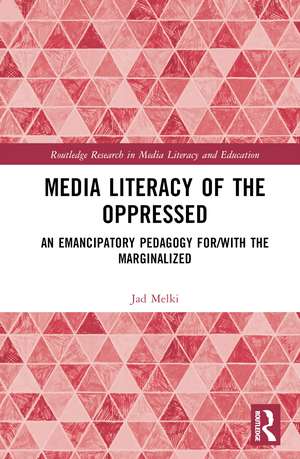Media Literacy of the Oppressed: An Emancipatory Pedagogy for/with the Marginalized: Routledge Research in Media Literacy and Education
Autor Jad Melkien Limba Engleză Hardback – 14 oct 2024
With an emphasis on developing critical and emotive consciousness — or unveiling the oppressor within — the book provides a unique perspective that fits the needs of people at the margins and challenges mainstream media literacy approaches that are mainly designed for the center and the Global North. The book offers a framework for designing curricula at and with the margins through an emancipatory media literacy approach. This approach directs energy toward resistance and praxis, focuses on local priorities of the margins, contextualizes issues within a postcolonial historical moment, and concentrates on fighting oppression structures and social injustice.
This book will be an important resource for scholars, educators, and students of media literacy, communication, cultural studies, critical pedagogy, health communication, postcolonialism, Arab studies, feminism, and human rights.
Preț: 1006.07 lei
Preț vechi: 1226.91 lei
-18% Nou
Puncte Express: 1509
Preț estimativ în valută:
192.51€ • 201.41$ • 159.92£
192.51€ • 201.41$ • 159.92£
Carte tipărită la comandă
Livrare economică 03-17 aprilie
Preluare comenzi: 021 569.72.76
Specificații
ISBN-13: 9780367334888
ISBN-10: 0367334887
Pagini: 246
Ilustrații: 86
Dimensiuni: 156 x 234 mm
Greutate: 0.62 kg
Ediția:1
Editura: Taylor & Francis
Colecția Routledge
Seria Routledge Research in Media Literacy and Education
Locul publicării:Oxford, United Kingdom
ISBN-10: 0367334887
Pagini: 246
Ilustrații: 86
Dimensiuni: 156 x 234 mm
Greutate: 0.62 kg
Ediția:1
Editura: Taylor & Francis
Colecția Routledge
Seria Routledge Research in Media Literacy and Education
Locul publicării:Oxford, United Kingdom
Public țintă
Postgraduate and UndergraduateCuprins
Chapter 1 – Failures of Mainstream Media Literacy: A Case for an Emancipatory Media Literacy Framework
Chapter 2 – Media Literacy of Oppressed Identities: An Intersectional Feminist Approach for the Whole Society
Chapter 3 – Media Literacy of Terrorism and Populism: The Symbiotic Relationship between Media and Oppression
Chapter 4 – Media Literacy of Colonialism, War, and Genocide: The Clash of Narratives and the Crushing of Worlds
Chapter 5 – Media Literacy of Pandemics and Infodemics: Saving Society from the Plague of Fake News, Mis/Disinformation, and Conspiracy Theories
Chapter 6 – Toward an Alliance of 21st -Century Intersectional Literacies
Epilogue: Marginal Issues, False Victimhood, and Performative Solidarity
Chapter 2 – Media Literacy of Oppressed Identities: An Intersectional Feminist Approach for the Whole Society
Chapter 3 – Media Literacy of Terrorism and Populism: The Symbiotic Relationship between Media and Oppression
Chapter 4 – Media Literacy of Colonialism, War, and Genocide: The Clash of Narratives and the Crushing of Worlds
Chapter 5 – Media Literacy of Pandemics and Infodemics: Saving Society from the Plague of Fake News, Mis/Disinformation, and Conspiracy Theories
Chapter 6 – Toward an Alliance of 21st -Century Intersectional Literacies
Epilogue: Marginal Issues, False Victimhood, and Performative Solidarity
Notă biografică
Jad Melki, Ph.D., is Professor of Journalism and Media Studies and the Director of the Institute of Media Research and Training at the Lebanese American University. He is also a visiting faculty at the Salzburg Academy, an affiliated researcher with ICMPA at the University of Maryland, and a visiting professor at Bournemouth University. In 2015, Melki won the UNESCO-UNAoC International Media and Information Literacy Award for advancing media literacy education in the Arab region through founding the Media and Digital Literacy Academy of Beirut. His research is at the intersection of media literacy, journalism, war, feminism, and health communication. He won the 2020 Shoman Arab Researchers Award for his impactful research on media in the Arab World. Previously, Melki was Founding Director of Media Studies at the American University of Beirut (AUB) and was affiliated with the University of Maryland, Johns Hopkins University, Towson University, and the Jordan Media Institute. As a former journalist, Melki was part of a team that won a Webby Award and a National Press Club Award for covering the 2006 Israeli war on Lebanon.
Descriere
This book offers an alternative approach to developing media literacy pedagogies for people in postcolonial countries and marginalized communities, especially in the Global South, tackling unexplored issues such as media literacy of war, terrorism, pandemics, infodemics, populism, colonialism, genocide, and intersectional feminism.











